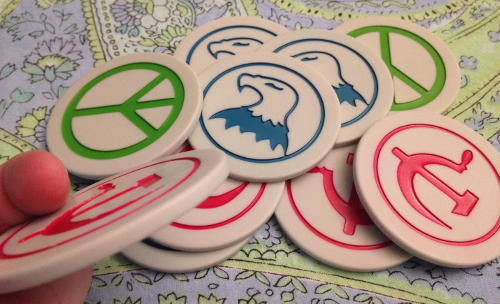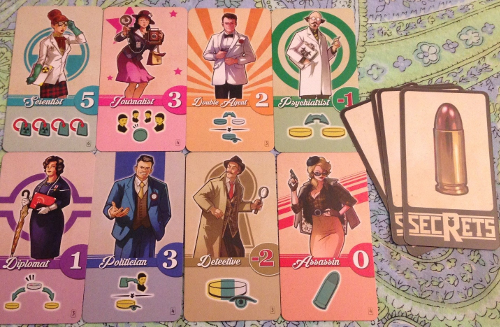Secrets Review
on Sep 6, 2017
They got it all wrong. The Cold War is often deglamorized as a political struggle full of tension and despair. Images flood our brain of children huddling under desks, nuclear war imminent and unavoidable. It's more fruitful to look at this conflict as a clash between the two most capable intelligence services in the world. Assets on both sides of the wall had more in common than they didn't, and both would ultimately unite in their hatred of the dirty hippie.
This is the untold story of that three-way conflict; stars and stripes colliding with hammer and sickle while an unshaven pinko tree-hugger Yojimbo plays both sides against each other.
This Bruno Faidutti and Eric Lang social deduction game sits in a weird place. It's Faidutti's second shot at Mascarade, taking that wily and chaotic design and smoothing it out a bit. While they have improved elements of that previous release, they’ve also introduced a couple of new gremlins.
Like Mascarade, a central part of Secrets is keeping players in the dark. You're dealt a CIA, KGB, or hippie token at the beginning of play. These are huge, engraved plastic discs that are chunky and feel excellent. You'll find yourself playing with them and clacking them on the surface of the table, occasionally wondering what's on the other side. You see, it's possible for your token to get swapped with another player or the extra disc in the middle of the table. You won't know when this has happened, merely that you could have been chosen along with another player. You'll need to try and pry it out of your buddy sitting next to you, too bad he's busy stinking up the joint and flaunting his unshaven hippie skin.

Peace and plastic.
The uncertainty of token swapping does occur on a less frequent scale than its predecessor. Here, you'll see at most two or three affiliation trades the entire game. The bulk of play is the active player deciding between two role cards they've drawn from a deck, and offering one to another player. The recipient doesn't know which of the two is up for grabs and will likely try and wrestle the truth from the Commie sitting across from them. Then they decide to either keep the card or push it back on the giver. Whoever ends up with it flips it face-up and keeps it in their display.
These role cards offer points - which you generally want - as well as special actions. The goal for the well-groomed players is to amass the most points between their team. The hippies are flying solo and one of them wins individually if they have the lowest score at the entire table. So you have multiple factions at cross purposes, two attempting to amass positive points and a lesser group trying to stink up the joint and take a dive.
Some of the role effects are interesting. The journalist has you close your eyes and show your faction token to the rest of the table. The assassin lets you deal a face-down bullet card to another player, it showing a negative or zero value on its face. The psychiatrist is the one that lets you swap two tokens. All of these options are fun, if not earth shattering.
There's a nice balance of wanting to receive positive points, assuming you don't play for team hip, while trying to maximize the benefit of the actions. There's also a great deal of discussion flying around about who's on what team and trying to organize among your allies. The game will immediately end when a player's display fills up, so there's a natural tension in players controlling the tempo of play.

The usual suspects.
Unfortunately, there are quite a few moments where this ICBM veers off-course and crashes into the pacific.
The big downside to a team-based game with swapping is that player agency can evaporate at the turn of a card. You can be sailing along, cutting across the water with ferocity and building up points like a madman. Then Jim Bob laughs as he flips the diplomat. When he swaps your faction token with the hippie in the center of the table you see red. It takes all 11 exercises you mastered at that anger management class not to punch him between the gap in his teeth.
In larger games you can go long chunks of time - of course relative in a 15 minute playtime - without having any say on the outcome or direction the table is heading. You can win by just sitting back and letting randomness and the foolishness of others dictate the outcome.
While it's nice to have a game that doesn't require the mental gymnastics of memorizing 10 roles being constantly swapped around the table, this is in the complete opposite direction where it's silly and random. Yet it doesn't quite measure up to the shenanigans of designs like One Night Ultimate Werewolf which make the most of its internal nonsense. Depth is missing and you often feel powerless to the way the current is headed.
Despite these criticisms, Secrets is not a bad game. It is novel for including a team-based element and it does a fantastic job of smoothly integrating new players. The divorcing of special abilities from your identity token makes for an experience that is easily taught as players don't need to understand every role and effect at the outset. But that's not really enough.
With competition in the social deduction genre fierce as ever, Secrets never really makes a name for itself. It's hard to imagine pulling this small box off the shelf when it’s sitting next to Secret Hitler, One Night Ultimate Werewolf, and even the more fulfilling Mascarade.

 Customer Support
Customer Support  Subscribe
Subscribe 




 Account
Account  Wishlist
Wishlist 

